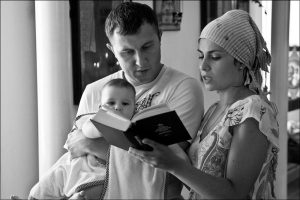Dear Dad:
Thanks for your splendid letter: Self-Sacrifice Is a Key to a Wonderful Marriage. I showed it to Anastasia – it floored her; she sent it to a couple of her friends back home who have not yet written back, but when they do, I’ll pass along their comments. I also forwarded your letter to some of my mates. I hope you don’t mind.
I have so many questions about the letter. But let me focus on one particular point you made: “love in marriage magnifies our human dignity as persons”. In other words, how does genuine human love in marriage amplify the dignity of two different persons over time in the face of so many difficulties? I will try to decipher what you mean in my own words keeping in mind the richness of Judeo-Christian scholarship and tradition over the past two thousand years.
When we were kids, you taught us loads of stuff, and, in retrospect, your letter reminded me of St. Basil the Great (330 – 379 AD) who said:
“Troubles are usually the brooms and shovels that smooth the road to a good man’s fortune; and many a man curses the rain that falls upon his head, and knows not that it brings abundance to drive away hunger.”
Even with my limited experience in life, St. Basil hit the nail on the head with his insightful comment. As a first point, you have urged us to see the hand of God in everything that happens or else we will either “go bonkers”, become selfish workaholics or voluntarily “zone out” and ignore others including our wife and kids – all different forms of escapism. That is one lesson Anastasia and I learned from your letter: face issues with optimism and hope.
As I continue to think about all of the advice you have given me since childhood, another clear take away from the letter is the idea that fidelity in marriage and the marriage covenant itself are aspects of Divine Providence (“Божественное провидение”) – the wisdom of God throughout the ages. No one should hide behind Divine Providence. In other words, Divine Providence, which is different from fate (“Судьба”), cannot serve as an excuse for laziness (“the couch potato” syndrome), defeatism (“that’s-just-the-way-things-are” syndrome) or for a non-scientific approach in addressing the problems and issues of daily life (“the-blame- God-for-everything” syndrome). Rather, Divine Providence through the marriage covenant is reflected in the person and attributes of the Holy Spirit (“Святой Дух”) in time, which is the source and guarantee of interior peace and joy.
The marriage covenant, boiled down to its essence, represents a love that opens the door not only to reconciliation with God for our negligence and weaknesses but recognizes the freedom of man and women to elevate themselves (as a team, if you will) to a state of intimate friendship with God in accordance with our human nature and teleology (end or purpose of existence). This is all a bit heavy but the point is simple: happiness in marriage is possible because marriage is designed to lead spouses to heaven as a result, in part, of being immersed in the Holy Spirit who is found in the love hidden in the challenges of married life.
Let me dig deeper into your letter. In order to grasp better the beauty of marriage and of St. Basil’s comments, husband and wife must see the Judeo-Christian worldview as a reasonable starting point, i.e.,
- God in fact exists and is, therefore, not a figment of the imagination filling some psychological need arising from insecurity or cowardice;
- a human being is in the image and likeness of God;
- God loves each and every human being madly; and for that reason, each of us receives encouragement and help from God in a very special, personal and often unknown manner.
These ideas lead us to understand better “who we are”, “where we come from” and “where we are going” in this life. Without such ideas, we are adrift in a sea of chance with no purpose other than self-perpetuation and comfort – which are depressing reasons for living and results, in most case, in personal ruin.
At a deeper level, it is important to see (even just a glimmer) that the relationship between God and man and the relationship between husband and wife are Trinitarian relationships, i.e., marriage is a reflection of the intimate and self-giving love between God the Father, God the Son and God the Holy Spirit. That idea indeed is a mouthful which I will not attempt to explain any further because it is beyond me. Let theologians shed more light on the question of the Trinity and marriage. You and I, if I may say so Dad, should stay clear of heavy duty thinking in the field of theology and stick to basics.
Bottom line: we need to be nourished often with good ideas so that we may find love in the daily opportunities and contradictions of each day. We need great ideas and a bit of grace to find and extract love in and from the ordinary events of each day. That idea, I gather, was one of the main points of your letter. In this connection, it is very important to receive regular spiritual direction from the local priest at the church. Moreover, monthly confession, at a minimum, would be indispensable to nourish our souls and strengthen the love of the Holy Trinity (“Святая Троица”) within us.
At a more prosaic level, in your letter, you urged Anastasia and me to connect in such a way that our hearts and minds would become one. Let me rephrase what I think you said. Marriage is a vocation, analogically reflects the Trinitarian relationship, and has a transformative power on the spouses. The bond between husband and wife can be transformed into a supernatural friendship (“friendship-ized”) through shared joys, tears, laughs, pains, dreams and hopes. That personal friendship is the work, in part, of the Holy Spirit.
You also urged us to recognize that the brooms and shovels and rainy days about which St. Basil spoke are necessary ingredients to bring about marital cohesion. We discover love in the little things and daily struggles of each day, elevating courtship to partnership and then to genuine friendship. I am not sure I completely get the profundity of self-sacrifice at this time in my life but I do recognize that I am happier when I watch television with Anastasia (“Antique Road Show”, for example), even though I hate it, than when I watch ice hockey without her. I need to take our relationship to the next level which means seeing most everything in her life as an opportunity to serve.
Let me broach a few other points which you indirectly touched upon in your letter. Anastasia and I have figured out that moral relativism as a guiding behavioral principle in a person’s life leads to interior imbalance and despair. We get that. We also get the difference between magic and miracles and between physics and metaphysics but it would be best to leave those topics for another day.
I am on board with the idea that the Judeo-Christian worldview empowers spouses to see the dignity of the human person, the purposefulness of life and the ability of men and women, together, to find and engage God in nature and the universe. Marriage, when embraced in a Judeo-Christian sense, is at the center of societal sanity and integrity. In other words, sound marriages reflect squared away hearts and minds as well as a healthy understanding of personal freedom and fraternity.
As we are all interested in the significance of the transformative power of marriage and of the meaning of genuine human development, Benedict XVI in Charity in Truth (2009) has offered a few splendid ideas for our consideration. His words are worth pondering:
“God is the guarantor of man’s true development, inasmuch as, having created him in his image, he also establishes the transcendent dignity of men and women and feeds their innate yearning to ‘be more.’ Man is not a lost atom in a random universe: he is God’s creature, whom God chose to endow with an immortal soul and whom he has always loved. If man were merely the fruit of either chance or necessity, or if he had to lower his aspirations to the limited horizon of the world in which he lives, if all reality were merely history and culture, and man did not possess a nature destined to transcend itself in a supernatural life, then one could speak of growth, or evolution, but not development. When the State promotes, teaches, or actually imposes forms of practical atheism, it deprives its citizens of the moral and spiritual strength that is indispensable for attaining integral human development and it impedes them from moving forward with renewed dynamism as they strive to offer a more generous human response to divine love.”[i]
Pretty good stuff, wouldn’t you say?
As you may suspect, Anastasia and I together wrote this note in reply to your letter. Did we more or less understand your observations? We had to read a bit, including The Confessions of St. Augustine (c. 398 AD), to gather our thoughts before penciling a few lines. In the process of reading and rereading your letter (many times), we drafted our response while sipping a couple of glasses of wine (on separate occasions, of course!) at a down-to-earth family restaurant in West Virginia. A little wine always helps us think better. Incidentally, we prefer supporting local family-owned small businesses where there’s always great service, great people and great food at affordable prices. Such places beat the big impersonal multinational eateries (chains) that tend to serve lousy food and provide faceless service.
Dad, thanks to you, I have not forgotten my Judeo-Christian roots nor the history of our ancestors. As Russian Patriarch Kirill has stated,
“We know, including from the lessons of our own history, that a people that has lost its historical benchmarks, that has renounced the continuity of generations, is easily converted into an object of social and ideological experiments. And the cost of such experiments is too high.”
Yes indeed.
You can be sure that Anastasia and I will do everything in our power (including prayer) so that we energize our love for each other and produce a family where we try every day to serve the others and live in accordance with the Judeo-Christian marriage covenant. There is no doubt that it is in the family environment where earth meets heaven. I agree with J. R. R. Tolkien who said in The Hobbit: “There is some good in this world, and it’s worth fighting for.” In this connection, more people should speak about marriage and its benefits to society.
And so, your letter made an impact on us – thanks! It is worth passing along to others. You can be sure that Anastasia and I will do our best to be faithful to each other, pray together and grow in the virtue of generosity each day. By so doing, our dignity as human beings and spouses will more and more reach towards the heavens in an effort to reflect the wisdom of God and his divine plan for each of us.
Talk to you soon Dad. Come and visit.
Cheers, Alexandre (and Anastasia)
PS: If you haven’t read The Lord of the Rings by J.R.R. Tolkien, I highly recommend it.
_________________________
[i] See: Pope Benedict XVI, Charity in Truth, “Caritas in Veritate.” San Francisco: Ignatius Press, 2009.


















